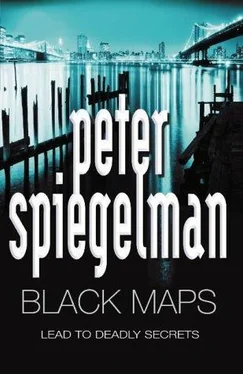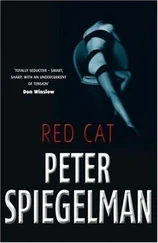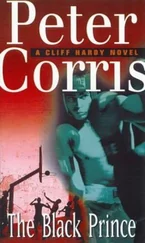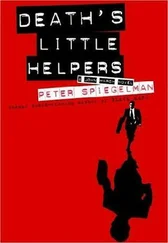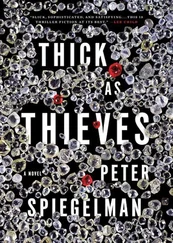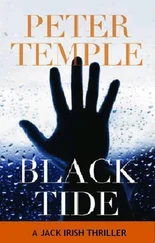Peter Spiegelman - Black Maps
Здесь есть возможность читать онлайн «Peter Spiegelman - Black Maps» весь текст электронной книги совершенно бесплатно (целиком полную версию без сокращений). В некоторых случаях можно слушать аудио, скачать через торрент в формате fb2 и присутствует краткое содержание. Жанр: Криминальный детектив, на английском языке. Описание произведения, (предисловие) а так же отзывы посетителей доступны на портале библиотеки ЛибКат.
- Название:Black Maps
- Автор:
- Жанр:
- Год:неизвестен
- ISBN:нет данных
- Рейтинг книги:4 / 5. Голосов: 1
-
Избранное:Добавить в избранное
- Отзывы:
-
Ваша оценка:
- 80
- 1
- 2
- 3
- 4
- 5
Black Maps: краткое содержание, описание и аннотация
Предлагаем к чтению аннотацию, описание, краткое содержание или предисловие (зависит от того, что написал сам автор книги «Black Maps»). Если вы не нашли необходимую информацию о книге — напишите в комментариях, мы постараемся отыскать её.
Black Maps — читать онлайн бесплатно полную книгу (весь текст) целиком
Ниже представлен текст книги, разбитый по страницам. Система сохранения места последней прочитанной страницы, позволяет с удобством читать онлайн бесплатно книгу «Black Maps», без необходимости каждый раз заново искать на чём Вы остановились. Поставьте закладку, и сможете в любой момент перейти на страницу, на которой закончили чтение.
Интервал:
Закладка:
The apartment was small, low ceilinged, and sterile, like a very tidy waiting room. I stood in a short hallway. On my left was a pocket kitchen, on my right a bedroom and a bath. The living room was a white cube, dead ahead. The furnishings were sparse and cheap. A beige sofa, a matching chair, and a coffee table were arranged in a corner. A low bookcase ran along one wall; a dining table did double duty as a desk along another. An oatmeal-colored rug hid most of the badly laid parquet floor. Across the room, a glass door opened onto one of the balconies I’d seen from the street. It was no bigger from up here.
The walls were empty. The only picture in the place stood on the dining table: a faded, silver-framed photo of a young woman holding a baby. What books there were, were arranged by size on the shelves, so that biographies and histories were mixed with textbooks on real estate, and a thick, black bible with books on low-salt cooking and weight loss. His few knickknacks-a pair of silver candlesticks, a small carriage clock, a red lacquer box-looked out of place, as if they’d lost their way en route to another, better-appointed life.
Burrows motioned me toward the sofa, and I sat. He took a pair of gold, wire-rimmed glasses from his shirt pocket and put them on, wrapping the earpieces behind his ears. They made his eyes bigger, and gave him a scholarly look.
“Something to drink, Mr. March?” he asked. “I’ve got ice tea, juice, water. I could put up coffee if you’d prefer.” His voice was deep and intimate sounding, but there was a stiff, almost formal quality to his speech and manner that made me think he wasn’t used to having anyone in the apartment with him.
“Water is fine,” I said.
He disappeared into the kitchen and reappeared with two glasses of water. He gave me one, along with a little paper napkin, and sat in the chair opposite me. He sighed heavily and looked down at his feet on the rug. He held his water glass with both hands and rested it in his lap. I noticed a gym bag and a pair of sneakers parked neatly in a corner by the door. I gestured toward them. “Just back from the gym?” I asked. The question seemed to surprise him, and he paused before answering.
“I am, yes. I go every night, after work.”
“Disciplined,” I said.
“I try to be.”
“What kind of work are you doing, now that you’re out of banking?” I asked.
He didn’t hear my question, or chose to ignore it. “As I said on the phone, Mr. March, I don’t know that I can be much help to you. I wasn’t much help to the federal people when they came to see me, either,” he said.
“When was that?”
“A long while ago. Two and a half years, maybe longer. But there wasn’t much I could tell them.” He took a slow drink from his glass. I smiled my best nonthreatening smile.
“Well, I’m starting with almost nothing on this, so whatever you can tell me I’m sure will help. And, as I mentioned on the phone, this is entirely confidential and off the record. The guy I’d like to talk to you about is Gerard Nassouli. I understand you worked for him.”
Burrows kept looking down at his feet and shook his head a little. “Yes, that’s who the federal people wanted to talk about, too. Where he might have gone to, who he might turn to if he was in trouble, had I heard from him, what did I know about his finances, did I know any of his friends, did I know of any property he kept overseas. They went on and on. I couldn’t help much.”
“They were interested in finding him, so they asked those kinds of questions. But finding him is not my problem. I’m more interested in what he was like. How he did business. How he made deals. I thought maybe you could take me through some that you worked on with him.”
“I’m not sure there’s much I can say.” He took another hit from his glass.
“You did work for him.”
“For seven years, the whole time I was at MWB. I was with the New York office, and Nassouli ran the office.”
“And you ran the correspondent banking department?”
“For six years. The first year, I was the number two person in the department. Then my boss went back to London and I took over.”
“And when you left MWB, you left banking altogether?”
Burrows looked up at me and straightened a bit in his chair. “I thought this was about Nassouli, not about me.”
“It is. But all you say about him is that you have nothing to say. So I figured we could talk about things you can tell me. Like why you left MWB when you did, and why you left banking.” I drank some water and continued. “I figure you must have been around thirty when you joined MWB. And you must’ve come in with a few years’ experience, if they hired you as the number two guy in the department. Even allowing for a couple of years in b-school and my bad arithmetic, you walked away from at least ten years in banking when you quit. That’s a big career investment to leave behind. Why’d you do it?”
Burrows looked at me for a while and shook his head a little. “It was over thirteen years, altogether, and my reasons were personal. Can you understand that?” he said, more tired than angry. “Look, if it’s me you want to discuss, I’m sorry, the answer is no.” He got up and carried his glass to the kitchen and returned with it filled.
“How did you know that I ran correspondent banking?” he asked.
“Research. That’s what I do.”
“And what has your research told you about Gerard so far?”
“Not a lot. That he was a big deal maker. That he was charming, and liked a party. That he liked women, and being seen with them,” I answered.
Burrows snorted. “He liked to be seen with them, and he liked to fuck them, that’s true. I don’t know how much he actually liked them. In fact, I think he hated them.” He stumbled a little over “fuck,” as if he was out of practice with vulgarity. He drank some water. “Deal maker, charming, life of the party-you’ve been talking to people who didn’t know him well.”
Alan Burrows was a paradox. On the one hand, he kept proclaiming that he had nothing to tell me. And, so far, he hadn’t told me much. On the other hand, he hadn’t thrown me out yet. And he kept on talking. There was some heavy conflict there, and that was good news for me. “You know different?” I asked.
He ran a hand through his damp hair and looked into his glass. “Charming, a big deal maker, loved parties-that was the press he put out, and it was true, as far as it went. But there was another story, altogether different.” He stopped and looked up at me again. “Your employer could write a book just on Gerard, but he’d have to do it as fiction, because nobody would believe it as fact.” His voice quavered, like he’d run out of air. He took a noisy swallow from his glass and then was still.
“I’d like to hear that story, and you’re the first person I’ve met who could tell it,” I said.
Burrows shook his head, more vigorously this time. “Tell it… Jesus… I’ve spent fifteen years trying to forget it,” he said, almost in a whisper.
“How’s that going-the forgetting?” I asked softly.
“Not well,” he said.
The lines seemed to deepen on Burrows’s ruined, handsome face, and his eyes looked moist and more tired than ever. He gathered some breath and asked, “Are you really working for a writer?” So much for my decent story.
“No,” I said after a while. “No, I’m not. I’m trying to help someone who did some business, legitimate business, with Nassouli a long time ago, and who’s run into trouble because of it.”
“Legitimate business-with Nassouli, I suppose that’s theoretically possible,” Burrows said with a small, harsh laugh. “But if your client did any kind of business with Gerard, he may need more help than you can give him. Tell him he should talk to a priest.”
Читать дальшеИнтервал:
Закладка:
Похожие книги на «Black Maps»
Представляем Вашему вниманию похожие книги на «Black Maps» списком для выбора. Мы отобрали схожую по названию и смыслу литературу в надежде предоставить читателям больше вариантов отыскать новые, интересные, ещё непрочитанные произведения.
Обсуждение, отзывы о книге «Black Maps» и просто собственные мнения читателей. Оставьте ваши комментарии, напишите, что Вы думаете о произведении, его смысле или главных героях. Укажите что конкретно понравилось, а что нет, и почему Вы так считаете.
